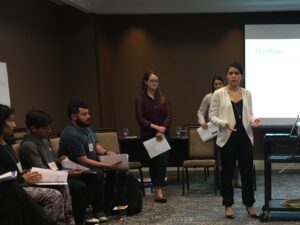Unfinished Business, a new report from the Sheller Center for Social Justice at Temple Law School and Villanova University Charles Widger School of Law reveals that in some Pennsylvania courts, non-English speakers may not receive interpretation assistance during their hearings. This report is a follow-up study to the Sheller Center’s 2014 survey of Pennsylvania’s magisterial district judge (MDJ) courts.
The study performed court observation in 19 MDJ courts in Montgomery, Delaware, and Chester counties. It found that the majority of courts observed failed to provide certified interpreters for civil hearings. Court staff also did not consistently provide interpreters when speaking with limited English proficient individuals at the front desk nor did they uniformly provide notice of the right to language services. A minority of courts, however, were observed to provide exemplary language services.
“What is most concerning about our results is the inconsistency between courts. This means that individuals with limited English proficiency have unequal opportunities to access and participate in court matters depending on their location,” commented Anne Bonfiglio, a 3L law student and co-author of the report.
Magisterial district judge courts are Pennsylvania’s “small claims” courts. Litigants in these courts frequently do not have attorneys. Without access to adequate interpretation, non-English speaking litigants cannot understand what is happening in their court case.
The study concludes that these variations among courts came from the lack of consistent procedures and the limited accountability for courts that fail to comply with state and federal law. Further, a judge’s personal commitment to and understanding of language services directly contributed to the quality of language services provided in the courthouse.
The study comes on the heels of a comprehensive statewide Language Access Plan issued by the Supreme Court in March 2017. In order for this statewide plan to be truly effective, this report calls for statewide training of court staff and judges as well as forceful monitoring and enforcement.

 Social Justice Lawyering Clinic Students Tessa Carson (’17), Emily Diaz (’18), and Ashley Rotchford (’18) created the
Social Justice Lawyering Clinic Students Tessa Carson (’17), Emily Diaz (’18), and Ashley Rotchford (’18) created the